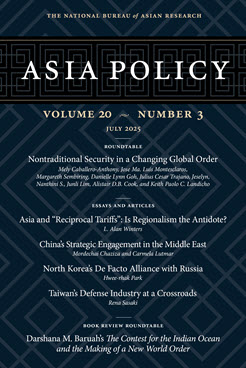Article in Asia Policy 20.3
North Korea’s De Facto Alliance with Russia
The Nuclear Ramifications
This article addresses the potential for North Korea to bolster its nuclear forces and counter U.S. extended nuclear deterrence for South Korea by pursuing a potential nuclear umbrella arrangement with Russia.
EXECUTIVE SUMMARY
MAIN ARGUMENT
North Korea has recently emphasized its ambition to achieve the reunification of the Korean Peninsula by even nuclear means if necessary. To this end, Pyongyang has sought to undermine U.S. extended nuclear deterrence to South Korea through its brinkmanship counter-deterrence strategy, which involves threatening nuclear strikes on U.S. cities. A new factor in this strategy is the possible role of Russia after Pyongyang and Moscow signed a partnership agreement in 2024. North Korea’s strategy would be further reinforced should it acquire technological assistance and possible extended nuclear deterrence from Russia.
POLICY IMPLICATIONS
- The U.S. and South Korea should conduct a thorough analysis of North Korea’s intentions, strategies, and posture regarding its counter-deterrence brinkmanship aimed at neutralizing U.S. extended nuclear deterrence and devise appropriate countermeasures.
- The U.S. and South Korea will want to closely monitor potential collaboration between Russia and North Korea on nuclear-related technologies and posture and should consider regular meetings or joint working groups between their intelligence agencies to facilitate this.
- The existing U.S.–South Korea Nuclear Consultative Group could be expanded to include Japan and Australia, creating a “Nuclear Planning Group–Pacific” to address the exacerbated North Korean nuclear threat in multilateral ways.
- The U.S. should communicate to Russia that transferring nuclear missile technology or providing extended nuclear deterrence to North Korea constitutes a direct challenge to U.S. security interests.
- Long-term, practical measures to strengthen the U.S. nuclear umbrella for South Korea could include the consistent deployment of U.S. nuclear-powered ballistic missile submarines near the Korean Peninsula or forward deployment of certain nuclear weapons in Guam.
Hwee-Rhak Park is a Visiting Scholar at the University of Massachusetts in Boston (United States). His research interests and publications focus on the North Korean nuclear threat.
About Asia Policy
Asia Policy is a peer-reviewed scholarly journal presenting policy-relevant academic research on the Asia-Pacific that draws clear and concise conclusions useful to today’s policymakers. Asia Policy is published quarterly in January, April, July, and October and accepts submissions on a rolling basis. Learn more


